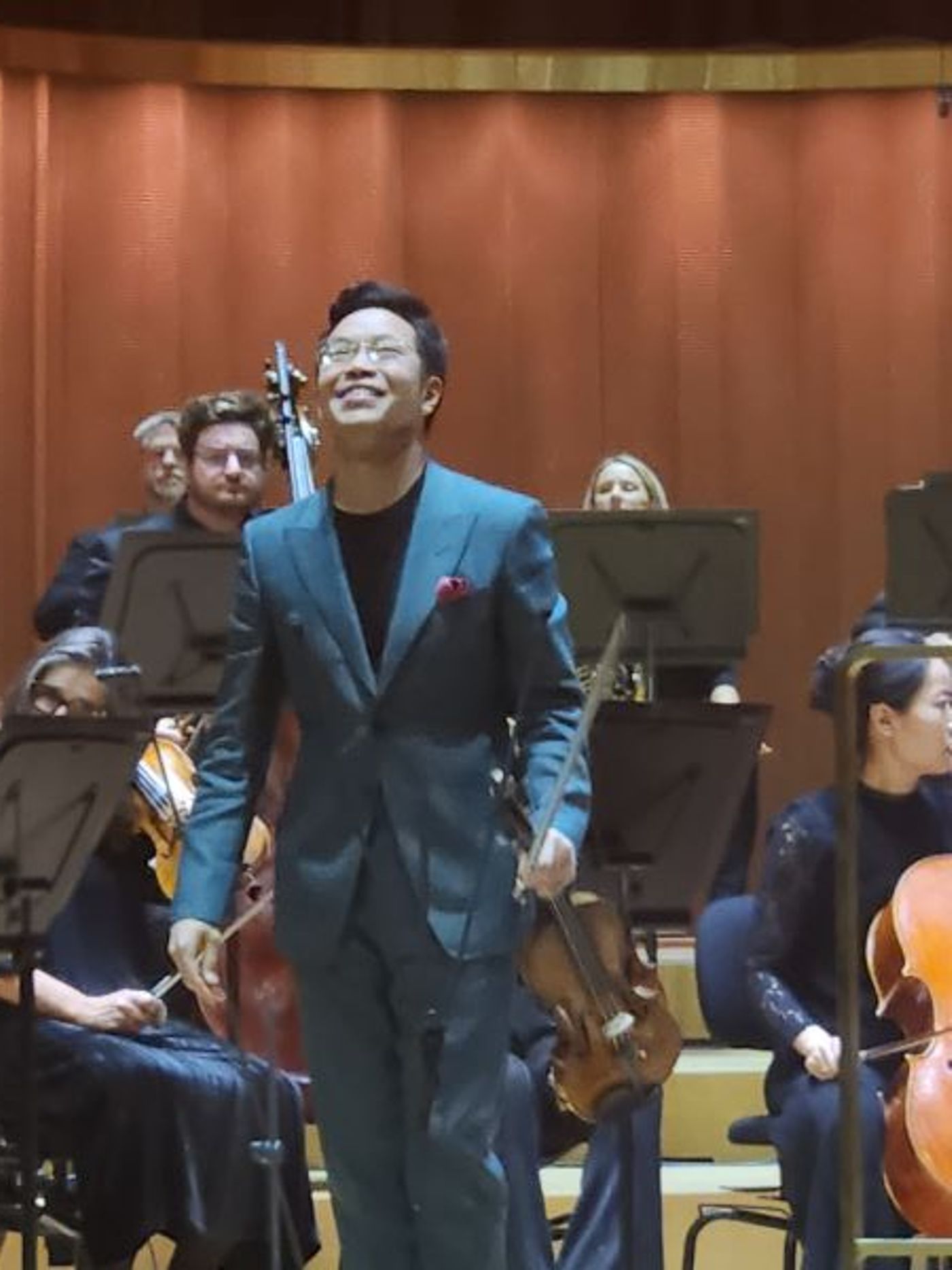Review: SAN DIEGO SYMPHONY PERFORMS MENDELSSOHN, BRUCH AND TCHAIKOVSKY at the Jacobs Music Center
Passion Reigns in Familiar Favorites

The music that people enjoy the most, whether they are fans of classical or hip hop, is music that evokes emotion. The San Diego Symphony under guest conductor Antonio Méndez took note of that with a concert of proven favorites, Mendelssohn’s Ruy Blas Overture, Bruch’s first violin concerto, and Tchaikovsky’s fifth symphony.
The first emotion of Mendelssohn’s overture is foreboding menace, but from there it is largely rising excitement that climaxes with heroic triumph in c major, the sunniest of all keys.
What were you thinking, Felix?
Ruy Blas is a tragedy. It ends with murder and the suicide of its main character. Your music doesn’t match!
That was apparently Mendelssohn’s intention. The overture is actually a mocking satirical comment on the plot of Victor Hugo’s Ruy Blas. He wrote to his mother, “I read the play, which was so absolutely ghastly and beyond contempt that you wouldn’t even believe it.” He went on to say, “Few of my works have caused me more amusing excitement. … I mean to call it, not the overture to “Ruy Blas,” but to the Theatrical Pension Fund.” (The organization which commissioned the piece and was admired by the composer.)
The overture has retained its original, though less colorful title. The play, despite Mendelssohn’s review, went on to modest success, and the story became the basis for an opera.
Maestro Méndez and the orchestra played the overture as a suitably rousing concert opener, one Rossini might have been proud to use for one of his comic operas. The quiet first theme allowed clarinetists Principal Sheryl Renk and Max Opferkuch to demonstrate their skills, and the way they stood out as soloists rather than muffled in the orchestra was further evidence of how successful the redesign of hall acoustics has been.
Violinist Paul Huang’s performance of Bruch’s best-known concerto was spellbinding and offered additional confirmation of acoustical excellence. (Photo Ron Bierman)

Before the renovation, even featured soloists performing in front of the orchestra sometimes seemed submerged within it. Huang was always front and center. I might have been listening to an impossibly live-sounding recording for which a sound engineer had gotten a perfect balance between the violin and orchestra.
Huang poured his heart and virtuosic talent into the music, and his passion and gorgeous tone were a perfect match for the concerto’s many attractive melodies. Tears may have been brimming in many eyes during moments of exceptional melodic beauty.
The performance was as affecting as any I’ve heard in a concert hall or on a recording. Not an easy feat with so familiar a work.
According to Presto Music, 215 different performances of Bruch’s first concerto are available for download.
Tchaikovsky’s fifth symphony is even more popular with 248 versions. It still pleases, but its familiarity and length does make it more difficult to bring back the pleasures of past hearings. On top of that, its best melody was turned into an even more familiar pop tune.
After a brief introduction, clarinets introduce a short dark melody often called the "Fate” motto or theme. It reappears in different orchestrations in all four movements and becomes a lively march in the last. Along the way, the composer’s marvelous gift for melody is proven with sumptuous abundance.
Deep string chords open the andante second movement before the famous French horn solo that inspired “Moon Love,” a song that was a hit for Frank Sinatra and others. Sinatra recorded it twice, with trumpeter Harry James’ band in 1939 and again in a 1966 album called Moonlight Sinatra for which Nelson Riddle did the arrangements.
(Fun fact: It wasn’t an accident that Sinatra’s voice was more full-bodied in the album version. During the interval between the two recordings he had worked with a retired opera singer. The two collaborated on a short book, Tips on Popular Singing. It was published in 1941.)
Principal Horn Benjamin Jaber delivered a warmly successful reminder of the melody’s beauty, one that had conductor Méndez call on him for a solo bow at curtain call.
The third movement brightens the emotional mood with a light-hearted waltz, and only gentle reminders that “Fate” is lurking. The fourth and final movement doubles down on the now often repeated motto, driving toward an exciting final triumphant statement which seems to proclaim, “I defy Fate!”
Guest Conductor Antonio Méndez’s appearance last season warranted a return, and he didn’t disappoint.
With graceful movements, Méndez seemed to be molding the sound with an attention to detail that brought out elements that often go unnoticed.
Section balances and dynamics were outstanding. Instead of their usual placement, the second violins were at the front of the stage opposite the first violins. In the hall’s new acoustics, that worked to delicious effect at times, especially in the symphony when the melody went from one side to the other to produce a clear stereophonic effect.
The closing movement of the symphony reached a rousing and exciting conclusion, though the tempo was a shade slow in its opening moments, and the movement’s first repetitions of the Fate theme could have had a greater feeling of unstoppable bravado as they transform the persistent motto from ominous to fiercely determined.
That subjective comment aside, this was an unusually satisfying concert, and there may be no greater season highlight than Paul Huang’s performance of Bruch’s first violin concerto.
Top photo of Conductor Antonio Méndez (credit Jenna Gilmer)
Reader Reviews
Videos

